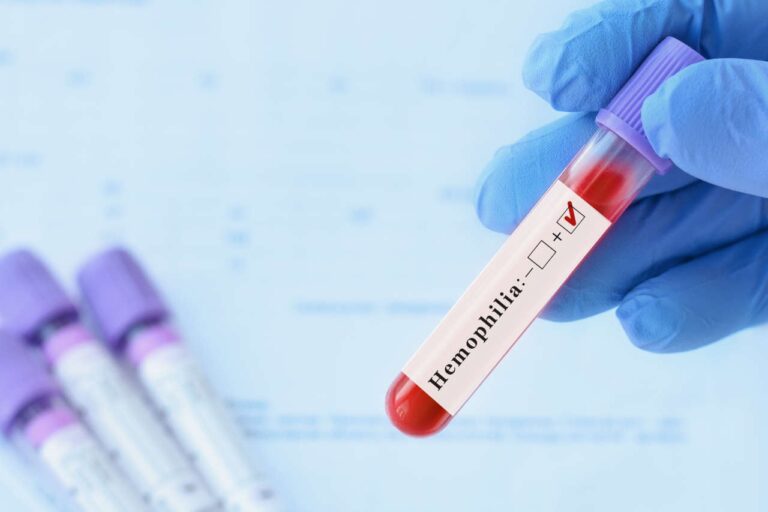
Hemophilia is an inherited (genetic) bleeding disorder in which blood clots cannot form due to a deficiency in clotting factors. Living with hemophilia can be challenging because it requires lifelong treatment and monitoring. Patients have to be mindful of their lifestyle and daily activities in order to prevent bleeding.
Hemophilia can also influence a patient’s mental health. In addition to medical care, patients should seek out emotional support when needed. This article discusses hemophilia management and healthy living strategies for patients living with hemophilia.
Get Financial Assistance
Copay AssistanceEmotional
Living with hemophilia can be restrictive. Patients may not be able to attend or perform certain activities due to the increased risk of bleeding. This inability can have negative effects on one’s psychological health and cause feelings of sadness, anxiety, or anger. Some strategies to help patients manage their psychological and emotional health are:
- Consulting a licensed therapist
- Meditation
- Taking steps to understand the disease state
- Working on projects that promote advocacy, awareness, and support for hemophilia
- Speaking with a friend or relative
- Joining a support group, which will allow patients to interact with others who have bleeding disorders
We encourage patients to try to find a solution that fits their needs and personality. If one method fails, patients should always try another.
Physical
To minimize hemophilia risks and effects, patients should always prioritize their health. It is important for patients to actively take care of their bodies and physical health as this can also benefit their mental health.
Physical considerations include:
- Recognizing emergencies: It is best to be mindful of minor, mild, and severe injuries. Patients should be educated on when to contact their providers and how to recognize emergencies. Severe bleeding can cause organ damage, which can be fatal.
- Wearing safety gear: Certain activities may require protective equipment such as helmets, knee pads, and elbow pads.
- Avoiding high-risk activities: Avoid activities that could cause internal bleeding and open wounds. This includes contact sports, high-impact sports, and other injury-prone activities. Swimming, jogging, pilates, yoga, golf, tennis, and dance are alternative activities for patients to consider.
- Making a plan for home management of bleeding: Even in the case of a minor injury, patients should consult their provider to prevent any excessive bleeding and infections.
- Following a healthy diet: A balanced diet can optimize body functions and prevent vitamin deficiencies and excessive bleeding.
- Physical activity: Exercising daily helps maintain strength, balance, and flexibility. Hemophilia can damage joints, so maintaining joint flexibility is especially important.
Social

Patients and their family members can both face social challenges as well. At times it might be difficult to participate in social events due to concerns about injuries and risks associated with hemophilia, especially in young children.
Essential factors to consider when socializing include:
- Maintaining confidence: It is crucial for children with hemophilia to learn how to manage their symptoms and be able to have independence in social situations. Children and adults with hemophilia should be educated on how to respond to various situations with confidence.
- Find fun and enjoyable activities: It is important to find activities and sports which fit the patient’s lifestyle. Patients should develop safe group activities to avoid bleeding. Swimming, dance, choir, theater, art, debate, music, and other options are available for children. For adults, golf, bowling, and yoga are activities to consider.
Speak to a Specialist About Copay Assistance
Practical
Other practical considerations for hemophilia patients are:
Time Off From Work or School
Coordinating medical care with other obligations such as school, social life, and hobbies takes planning. Always try to balance life with patience. Patients should consider their needs and be flexible in order to better manage their daily life. It is always beneficial to inform a patient’s school or workplace of their condition to prevent any accidents and have support during times of need.
Family Planning
Hemophilia can be passed down from parent to child. Consider the risks during family planning and pregnancy, and always discuss any concerns with your healthcare provider.
REFERENCES:
- Parviniannasab AM, Rakhshan M, Momennasab M, Soltanian M, Rambod M, Akbarzadeh M. Haemophiliac adolescents’ perspectives of resilience: A qualitative study based on the resilience in illness model. Clin Child Psychol Psychiatry. 2020 Apr;25(2):346-358. doi: 10.1177/1359104519890905. Epub 2019 Dec 8. PMID: 31814433.
- Torres-Ortuño A, Cuesta-Barriuso R, Nieto-Munuera J, Galindo-Piñana P, López-Pina JA. Coping strategies in young and adult haemophilia patients: A tool for the adaptation to the disease. Haemophilia. 2019 May;25(3):392-397. doi: 10.1111/hae.13743. Epub 2019 Apr 17. PMID: 30994251.
- Reinicke K, Søgaard IS, Mentzler S. Masculinity Challenges for Men With Severe Hemophilia. Am J Mens Health. 2019 Jul-Aug;13(4):1557988319872626. doi: 10.1177/1557988319872626. PMID: 31451017; PMCID: PMC6712760.













